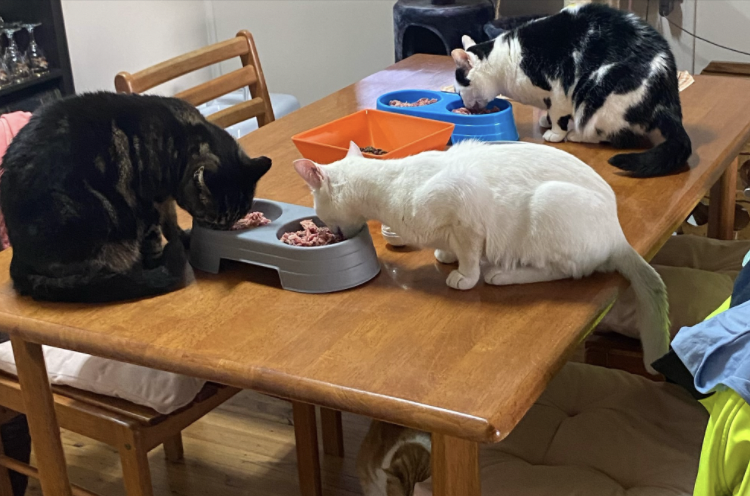Got a stray cat visiting your home? Or want to be prepared for incase you find a litter of kittens? It’s a common occurrence, but how you handle the situation can make a big difference in the lives of these feline visitors and the environment. If you’re wondering what to do when you have a stray cat at your doorstep, you’re in the right place. Into Loving Homes is here to offer guidance on the compassionate and responsible steps to take in order to keep them warm, fed, healthy, out of shelters and off of deathrow.
Has Mum Really Abandoned Her Babies?
Stray cats, especially mothers, may temporarily leave their kittens for various reasons. Just like human parents, cats need breaks too. They may be out looking for food, taking a rest, or ensuring the safety of their babies. It’s essential not to jump to conclusions and avoid separating the family too young and without a helpful plan in place.
Don’t Break Up a Family!
If you notice kittens with a stray mother, watch from a safe distance over a 24-hour period without scaring the mother away. It’s crucial to keep the family together as the mother is best equipped to care for her kittens. She provides warmth, nourishment, and essential life skills such as play and hunting. Importantly, her milk helps boost their immature immune systems. There really is no love like a mothers love for any species.
Helping Mum
Offer a bowl of water and some food. Cat food, meat or tinned fish will suffice. Be cautious not to frighten the mother, and leave her alone while she eats. If the kittens are mobile, they might be old enough to eat as well so leave extra for them.
Catching and Keeping Kitty Safe
Only attempt to catch kittens if you can do so without risking harm (yourself and them) and can afford the upcoming vetting (desexing and microchip). If the mother is timid or wild, contact your local council and animal welfare groups for assistance with trapping. Unsterilised females can have many, many litters and can begin from just 4 months of age, so act quickly but do not take the kittens or cat into a shelter or pound as their chance of making it out is slimmer than you may want to believe.
Rehoming the Litter
Once the kittens reach an appropriate age and weight (ask your vet what this number is, it can vary), take them to the vet for desexing, microchip and a health assessment. Once the vet work is done they are ready to be adopted. Contact us via FB messenger here to begin.
What About Mum?
Tame adult cats who have never lived indoors may not be good candidates for rehoming. They may never adapt to indoor life, which isn’t ideal for them or their adopter. On the other hand, a healthy, desexed adult cat used to living outdoors can thrive if desexed and provided with regular meals and water. We also have a barn cat program for those cats not safe to live where they are. After you get their vetting done we can begin the steps to adoption. Contact us via FB messenger here to begin. We have an incredibly successful Barn Cat program that they may be suited to.
Your Role in Your Community
If you decide to care for a community cat, become the listed contact on their microchip, and let your neighbours know that you’re looking after a desexed, stray cat. Share your contact details and ask them to reach out if they have concerns. Most people are understanding once they know someone is taking control of the situation and care of the animal. Especially if the cat is managing the local rodent population. Providing desexing for a stray cat is a giant positive for the environment, a single pair of cats can produce 420,000 kittens in just 7 years. A desexed cat can produce none.
Remember Basic Needs
Ensure the neighborhood cat has somewhere warm to sleep in the winter and access to extra water in the summer months. By acting compassionately and caring for these homeless animals, you’re not only saving lives and preventing breeding but also inspiring others to show compassion. Your efforts are truly commendable, and the experience will stay with you forever. Thank you for being part of the solution. Together, we make a difference.


